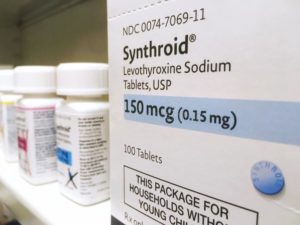 Synthroid® (also known by Levothyroxine and Thyroxine) is a medication often prescribed for the treatment of Hypothyroidism and Hashimoto’s Disease. While some patients see improvement from Synthroid, many get no relief from taking this medication.
Synthroid® (also known by Levothyroxine and Thyroxine) is a medication often prescribed for the treatment of Hypothyroidism and Hashimoto’s Disease. While some patients see improvement from Synthroid, many get no relief from taking this medication.
The thyroid is a butterfly-shaped gland located in the front of your neck. Its function is to regulate metabolism, heart rate, bone development, mood, brain function, and muscle function.
If the thyroid is not producing enough hormones, it can cause symptoms such as:
- Fatigue

- Weight gain
- Hair falling out
- Increased cold sensitivity
- Constipation
- Dry skin
- Puffy face
- Brittle nails
- Decreased sex drive
- High cholesterol
- Infertility in women
The thyroid regulates T1, T2, T3, and T4 hormones. Generally speaking, it is very common for a doctor to order lab tests to only check levels for TSH (Thyroid Stimulating Hormone). If the test indicates that the thyroid is not producing enough hormone, then the patient is usually prescribed Synthroid, which is the inactive version of T4.
Unfortunately, in a lot of cases, this does nothing to alleviate the symptoms or to help the patient as there are other conditions that can occur with the thyroid gland that do not show up on a TSH blood test and which should not be treated with Synthroid.
In some people, T4 is being produced in sufficient amounts, but their T4 is not being converted into T3, which is the ACTIVE form of the thyroid hormone. It is T3 that the cells need in order to function properly. If this is the case, and your doctor has prescribed you Synthroid, you are most likely not going to feel any better by taking this. You may even feel worse, as this can contribute to another imbalance known as Reverse T-3 where your symptoms of Hypothyroidism are further exaggerated.

Another factor that should be taken into account is Hashimoto’s Disease. This is an autoimmune disorder that occurs when your own immune system’s antibodies attack the thyroid gland. Hashimoto’s is a fairly common cause of Hypothyroidism. However, if it’s not able to be diagnosed and treated, then the root cause will never be identified. T4 Synthroid will not only be useless in treating it, the condition will worsen over time. The thyroid testing that we do at Renewed Vitality includes checking to see whether antibodies are present, which are a strong indicator of Hashimoto’s.
Other factors can contribute to Hashimoto’s including depletion of cortisol, which is affected by traumatic and/or chronic stress, and this can be both physical and emotional stress. As well, there are numerous other factors that can send your immune system into overdrive and these need to be isolated and addressed as part of treating Haashimoto’s.
Hypothyroidism and Hashimoto’s Disease do not usually just go away. They can be treated IF the treatment is the correct protocol (and the doctor knows how to interpret the lab results). There may be other underlying deficiencies which may be contributing as well, so it’s crucial that all functions of the thyroid be checked. Imbalances with the thyroid gland can wreak havoc on our health and the way we feel.
At Renewed Vitality, our providers specialize in treating disorders of the thyroid. We don’t want to just treat symptoms and thus always look for the underlying causes. We want you to feel your best again.
I am so happy to have found this website. I was diagnosed with Hashimoto’s disease in 2013. However, it took 7 years and an additional 75 lbs (200lbs) later, before this diseased was discovered by my Endocrinologist, not by my primary doctor, who missed it for 7 years. Also, I have been diagnosed with Celiac and dry eye diseases, which is very frustrating and depressing.
I take Synthroid and Rx eye drops, daily.
I am still very young at heart. My life has changed because it is very painful and tiring to do some of the outdoorsy things that I enjoy.
I Thank God every morning for allowing me to wake up; and for giving me the strength and energy to get through each day. Some days are better than others.
Dede